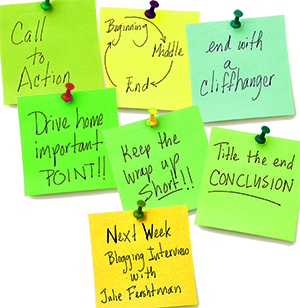Good Endings Make Good Beginnings


"I don't know how to end this blog post," Linda said to her brother Lance. He looked up at her standing in his office doorway, holding a yellow legal pad covered with crossed out sentences.
"Endings are hard," said Lance. "They are as important as the beginning. Maybe more so, since the ending is your last chance to move your reader to action."
Lance is right. A well-written ending can inspire your readers to:
- Leave a comment starting a new conversation
- Subscribe to your blog
- Share your post on social media
- Use the online scheduler on your SBM Member Directory profile to request an appointment
What are some effective ending techniques for blog posts?
- Tell the reader what to do next. Include a call-to-action in the conclusion such as including links to more information on the topic on your blog, an outside resource, or ask the reader to share your blog post.
- Come full circle. If you're pressed for time, simply look at how you started the article and rephrase it for your ending. Using your introduction to inspire your ending gives your readers a satisfying sense of closure.
- Like the TV shows in their finales, end with a cliffhanger. A good cliffhanger leaves your audience wanting more. It continues the experience in their imagination of what comes next. Let them know the topic of your next blog, which expands or clarifies a point raised in this blog. This will encourage them to return or subscribe.
- Use your last paragraph to drive home the most important point in your blog. Focus on the one thing you want your reader to remember.
- Make it short. The reader knows when it's near the end, so wrap it up in a few sentences and don't include any new material.
- Title it Conclusion and make it bold. It's straightforward and direct. The reader knows this is the end.
Now I've come to the end of an article about endings. What am I going to do?
I could summarize the main points above, however, I think the main point is to use your ending to inspire readers to keep reading your blog. Give them a call to action. Linda will do this by adding links to other sources of information on her Elder Law topic.
I will end by urging you to tune in next week for an interview on blogging with Julie Fershtman, former State Bar president and an active lawyer-blogger.
 Roberta Gubbins has served as the editor of the Ingham County Legal News. Since leaving the paper, she provides services as a ghostwriter editing articles, blogs, and e-blasts for lawyers and law firms. She is the editor of Briefs, the Ingham County Bar Association e-newsletter, and The Mentor, SBM Master Lawyers Section newsletter.
Roberta Gubbins has served as the editor of the Ingham County Legal News. Since leaving the paper, she provides services as a ghostwriter editing articles, blogs, and e-blasts for lawyers and law firms. She is the editor of Briefs, the Ingham County Bar Association e-newsletter, and The Mentor, SBM Master Lawyers Section newsletter.
Read More Clear & Convincing Articles
Using the New Enhanced Member Directory
How to Login and Edit Your Profile
Zeekbeek For Lawyers Page—learn about all the new directory features
How to Contact ZeekBeek Support